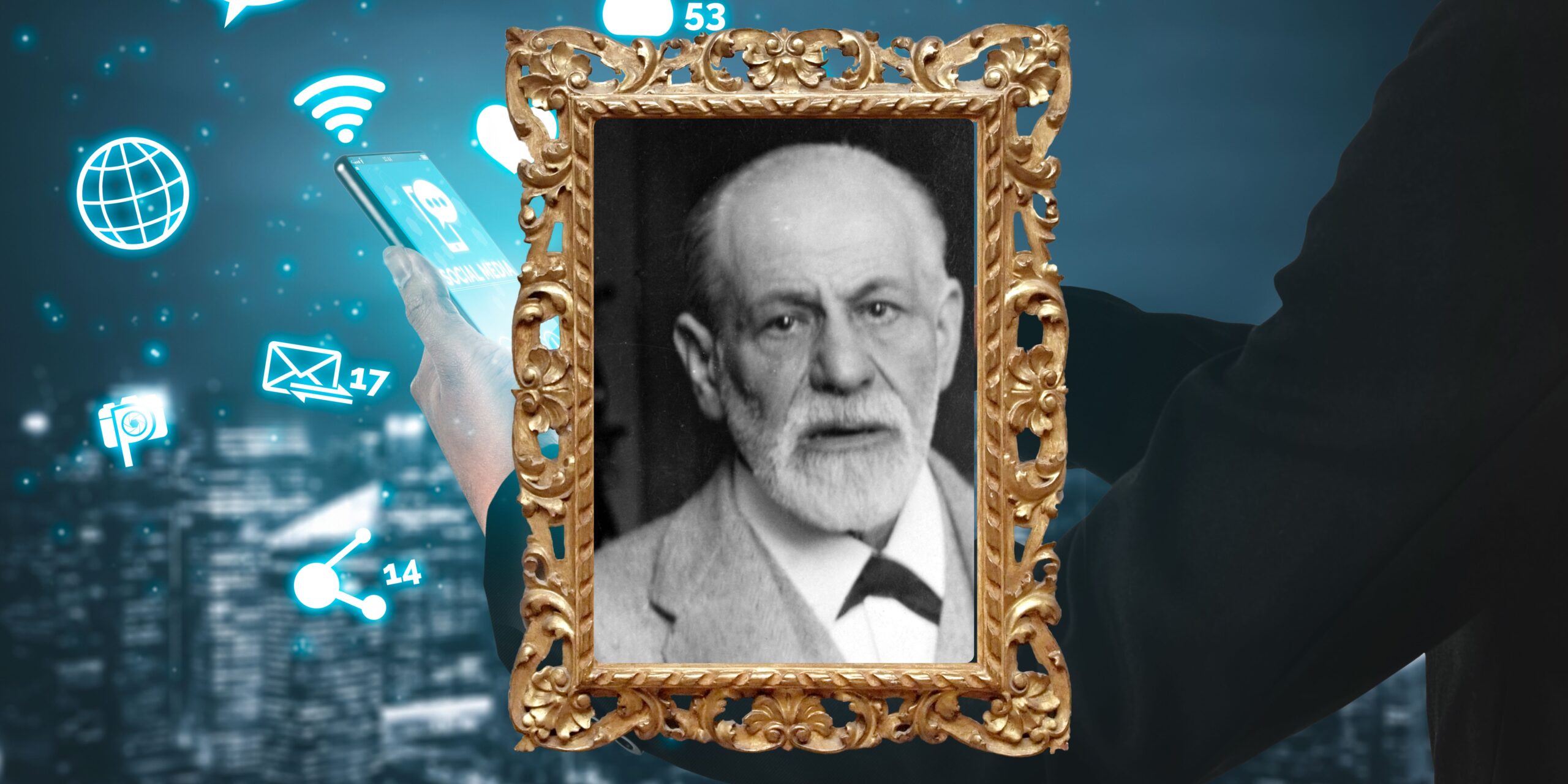Sigmund Freud, the founding figure of psychoanalysis, dedicated his life to understanding the intricacies of the human mind. While he lived a time long before the advent of social media, it is intriguing to consider what he might have thought about these digital platforms and their profound impact on our lives. What would Freud have made of social media, a landscape of curated personas, constant validation-seeking, and the blurred lines between the real and the digital self?
The Digital Playground of the Id
Freud’s framework of the mind concerned three drivers, the id, ego, and superego and this framework can be applied to social media. The ‘superego’, our moral compass, often grapples with the ethical dilemmas of the online world. Cyberbullying, privacy concerns, and online harassment present challenges that can strain the superego’s ability to guide behavior.
In Freudian terms, the ‘id’ represents our primal desires and instincts, seeking instant gratification. Social media platforms, with their likes, comments, and notifications, provide the ideal playground for the id. Users post pictures, videos, and stories, craving the validation and attention that gratify their ego. The constant engagement with social media reflects the instinctual nature of our desires, where immediate rewards reign supreme.
Where as the ‘Ego’ mediates the the relationship between our primitive desires (id) and the our moral constraints (superego). It is the part of us that governs self-presentation and identity management, helping us strike a balance between self-expression and societal expectations. The ego also helps us to remain true to ourselves and not get too lost in the image we create of our idealised self.
The Unconscious Mind in the Digital Age
One of Freud’s central ideas was the concept of the unconscious mind, where repressed thoughts, desires, and fears reside. So with this in mind, Freud may propose that our online presence is more than a way of remaining connected, advertising or showing ourselves, but instead it may represent or gratify many unconscious needs for us. Maybe you grew up feeling ‘unseen’, perhaps then social media becomes a place where this unmet need drives a desire for an audience, alternatively it could potentially repeat the trauma (re-enactment) creating emotional wounding, envy and pain when others gain large followings and your own remains low.
On social media, individuals craft a curated version of themselves, constructing a facade that conceals their true self. The dichotomy between the digital persona and the real self can lead to a sense of disconnection from one’s true identity and Freud might argue that this dissonance could contribute to anxiety, insecurity, and existential questions about authenticity in the digital age.
Defense Mechanisms in the Online Realm
Freud proposed various defense mechanisms as ways individuals cope with inner conflicts. In the context of social media, these mechanisms are evident in users’ online behavior. Projection, for example, occurs when individuals project their own insecurities onto others’ posts, leading to judgment and criticism. Displacement may occur when users transfer their frustrations or other feelings from one aspect of life to the online world. Sublimation can be seen when users channel their emotional energy into creative endeavors inspired by their social media experiences. Regression can be seen in the wishes of many adults to escape their ‘real world’ responsibilities by becoming online millionaires by simply ‘playing’ games, unboxing or carrying out other playful challenges online, forgetting the level of ‘adult work’ that inevitably goes into creating multi-million pound accounts.
The Digital Self: A Complex Construct
The concept of the digital self is a particularly intriguing aspect of social media, and Freud would have found it fascinating. Individuals carefully curate their online identities, often projecting an idealised version of themselves. This constructed online self can lead to a profound sense of alienation as individuals grapple with the tension between their digital persona and their true self. Constant comparisons with others on social media can evoke envy, a powerful emotion in Freudian theory. People may feel inadequate or resentful when they perceive others as more successful, attractive, or happy based on their social media posts. At its best envy can drive us towards obtaining what we want, at it’s worst it can become very toxic and create envious attacks, which is evident online with the amount of trolling that goes on.
Interpersonal Relationships in the Digital Age
Freud’s ideas about relationships within the family unit, can be adapted to understanding the dynamics of online communities and digital tribes. What roles did we play in our families, what culture did our family subscribe to? And, do we find ourselves playing out those same dynamics online? Afterall, the online world in some ways is very similar to the real world in terms of relationships. It is humans interacting with humans just through the filter of the internet, devices, images, videos and typed words.
Individuals seek validation and belonging within groups, forming connections that often revolve around shared interests and identity be that online or in real life. However, the question of the authenticity and depth of these digital relationships remains a subject of exploration.
In short, while Sigmund Freud never had the opportunity to witness the emergence of social media, his psychoanalytic theories offer valuable insights into the profound psychological effects of these digital platforms on individuals and society as a whole. The id’s quest for instant gratification, the unconscious mind’s conflict between digital and real identities, the use of defense mechanisms in online interactions, the creation of the digital self, and the impact on interpersonal relationships all provide rich material for exploring the Freudian perspective on social media. If there is such a thing as an after-life I’m sure Freud is there now writing many a paper on our modern society.




